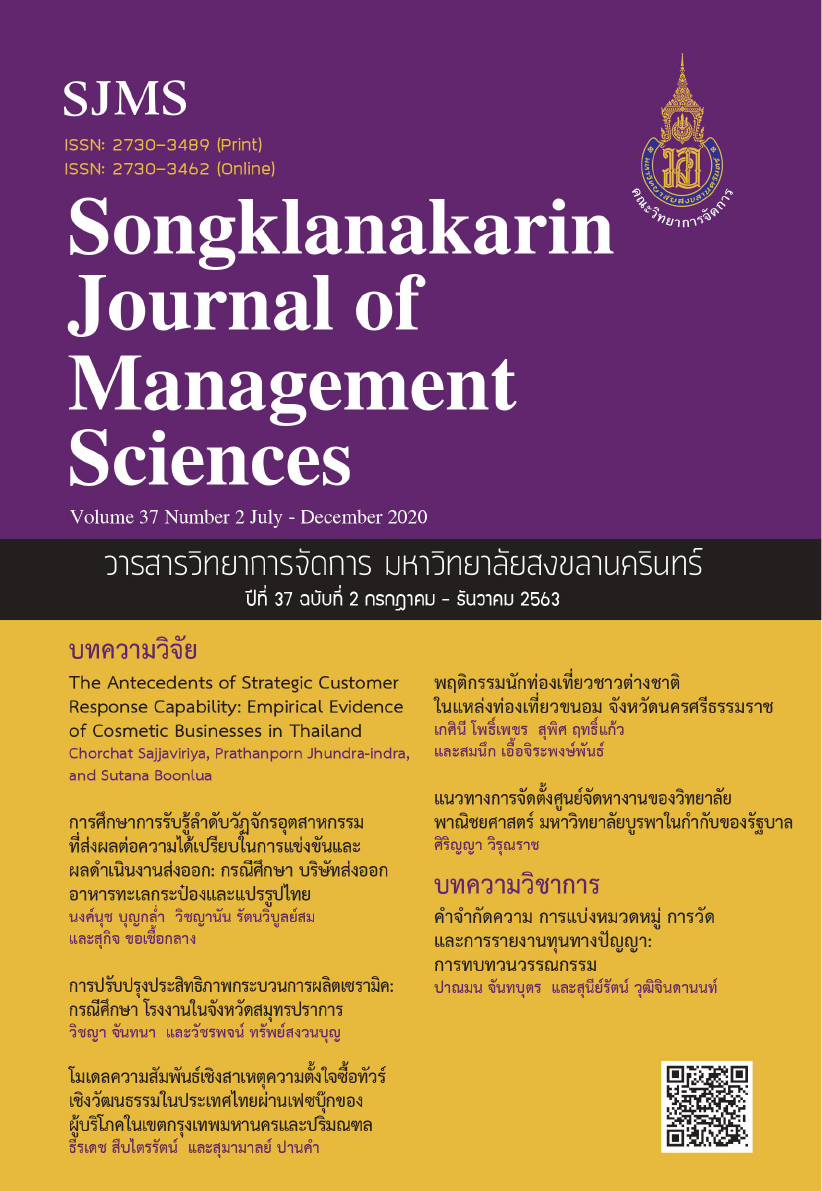Causal Relationship Model of Purchase Intention on Cultural Tour in Thailand via Facebook of the Consumers in Bangkok and its Vicinity
Main Article Content
Abstract
This research aimed at developing a causal relationship model of purchase intention on cultural tour in Thailand via Facebook of the consumers in Bangkok and its vicinity and verifying the model’s consistency with empirical data. The samples were 400 people who had an experience in purchasing cultural tours in Thailand via Facebook (obtained by convenience sampling). The research instrument was online questionnaire. The data was analyzed by the Structural Equation Model, containing four groups of factors namely (1) Electronic Word of Mouth, (2) Destination Image, (3) Attitude Toward Destination, and (4) Purchase Intention on Cultural Tour.
The result found that the proposed causal model fitted very well with empirical data. The R-Square of the model was 0.96, indicating that the structural model explained 96 percent of the outcome of the purchase intention on cultural tour in Thailand via Facebook. The factors influencing the purchase intention, ordered by the size of total effect (from the largest to the smallest), were (1) Electronic Word of Mouth (total effect 0.91), (2) Attitude Toward Destination (total effect 0.61), and (3) Destination Image (total effect 0.46). The result was beneficial to cultural tour operators and offered several suggestions. The tour operators should post engaging cultural contents and beautiful and historically valuable images and make their travel services well-known to travelers in order to encourage word of mouth among travelers and promote purchase intention of Thai travelers who favor cultural tour.
Article Details

This work is licensed under a Creative Commons Attribution-NonCommercial-NoDerivatives 4.0 International License.
All published articles are SJMS’s copyright. The editorial board allows all published articles to be copied, excerpted, or disseminated with academic citation.
References
Ajzen, I. (1991). The Theory of Planned Behavior. Organizational Behavior and Human Decision Processes, 50(2), 179–211.
Angwanitchakul, W. & Prajaknate, P. (2015). The Influence of Electronic Word of Mouth (E-WOM) to Making the Decision for Purchase Travel Program at Travel Agency. The 2015 National Conference of the National Institute of Development Administration (p. 18-27). Bangkok.
Bangsantier, P. (2015). The Travel Agent is Out: the Review is Now the New, Powerful Wave. Bangkokbiznews. Retrieved May 2, 2020, from www.bangkokbiznews.com/news/detail/655919
Bigne, J., Sanchez, M., & Sanchez, J. (2001). Tourism Image, Evaluation, Variables, and After Purchase Behavior: Inter-relationship. Tourism Management, 22(6), 607–616.
Bikazine. (2010). Biking to Track the Trail of Rattanakosin Era (7th Trip). Bikazine. Retrieved May 3, 2020, from http://www.bikegazine.com/2010/05/blog-post_27.html
Chaijan, S. (2016). Attitudes and Behavioral Intention Toward Tourism in Thailand among Baby Boomer Group in Bangkok and Its Vicinity. Journal of Humanities and Social Sciences, 8(15), 160-181.
Denchai, K. (2015). The Influence of Social Media Behavior and Awareness of Online Information on the Tourist’s Selection of Destination and Accommodation in Pattaya. The Independent Study of the Master’s Degree in Tourism and Service Industrial Management. Bangkok University, Pathum Thani.
Eureka Consulting. (2012). Thailand Destination Image from the Viewpoint of Foreign Tourist. Tourism Authority of Thailand Review. Retrieved May 1, 2020, from http://www.etatjournal.com/web/menu-download-zone/menu-dl-executive-summary/14-cate-download-zone/cate-dl-executive-summary/460-dl-2012-th-destination-image
Gretzel, U. & Yoo, K. (2008). Use and Impact of Online Travel Reviews. Information and Communication Technologies in Tourism 2008. 35–46. New York: Springer-Verlag.
Hair, J. F. (Jr.), Hult, G. T. M., Ringle, C. M., & Sarstedt, M. (2014). A Primer on Partial Least Squares Structural Equation Modeling (PLS-SEM). California, CA: Sage.
Publications.Henseler, J., Hubona, G., & Ray, P. A. (2016). Using PLS Path Modeling in New Technology Research: Updated Guidelines. Industrial Management & Data Systems, 116(1), 2–20.
Jalilvand, M. R., Samiei, N., Dini, B., & Manzari, P. Y. (2012). Examining the Structural Relationships of Electronic Word of Mouth, Destination Image, Tourist Attitude toward Destination and Travel Intention: an Integrated Approach. Journal of Destination Marketing & Management, 1(1-2), 134-143.
Jalilvand, M. R., & Samiei, N. (2012b). The impact of electronic word of mouth on a tourism destination choice: Testing the theory of planned behavior (TBP). Internet Research, 22(5), 591–612.
Jankingthong, W. (2014). Destination Image in Thailand. Silpakorn University Journal, 34(1), 31-50.
Jittijarunglap, K. (2019). The Impact of Electronic Word of Mouth on Online Shopping Behavior. Journal of Information Systems in Business, 5(2), 43-65.
Krishanapakornkit, W. (2013). Social Media and the Changing Landscape of Tourism. TAT Review Magazine. Retrieved May 5, 2020, from http://www.etatjournal.com/mobile/index.php/menu-read-tat/menu-2013/menu-2013-jan-mar/20-12556-social-media
Matichon. (2019). Analyzing the Tourism Trend of Using Social Media for Planning Travel Routes. Matichon Daily. Retrieved May 1, 2020, from https://www.matichon.co.th/lifestyle/news_1564934
Pinkaew, K. (2019). Cultural Tourism Destinations. Retrieved December 16, 2019, from https://tourism-dan1.blogspot.com/
Rangsungnoen, K. (2011). Factor Analysis using SPSS and AMOS for Research. Bangkok: SE-ED Education.
Rovinelli, R. J. & Hambleton, R. K. (1977). On the Use of Content Specialists in the assessment of Criterion-referenced Test Item Validity. Dutch Journal of Educational Research, 2(2), 49-60.
Sathitrakwong, T. (2017). Perception of the Online Information and Social Media Behavior for Thai Tourist’s Decision in Selection of Travelling in the Cultural Attractions in Bangkok. The Independent Study of Master’s Degree in Strategic Communication. Bangkok University, Pathum Thani.
Suatet, P. (2019). The Development of Content Presentation of Cultural Tour on Social Media and the Creation of Engagement with Message Recipients on Facebook Fan Page: World Trip. The Independent Study of the Bachelor’s Degree in Communication Arts. Panyapiwat Institute of Management, Nonthaburi.
Tangjitwattana, B. (2005). The Sustainable Tourism Development. 1st edition. Bangkok: Thammasat University.
Tourism Authority of Thailand. (2020). Presentation of the Directions to Promote Tourism of the Tourism Authority of Thailand in 2020. TAT Review Magazine. Retrieved May 2, 2020, from https://www.tatreviewmagazine.com/article/tourism-direction-2020
Woomi, P. & Soocheong, J. (2008). Destination Image and Tourist Attitude. Tourism Analysis, 13(4), 401–411.
Worakunamornrut, S. & Boonmeesrisanga, M. (2017). The Patterns of Cultural Tourism of the Elderly in Bangkok. The RMUTCON 9th: Creative RMUT and Sustainable Innovation for Thailand 4.0 (p.1522-1530). Bangkok.

